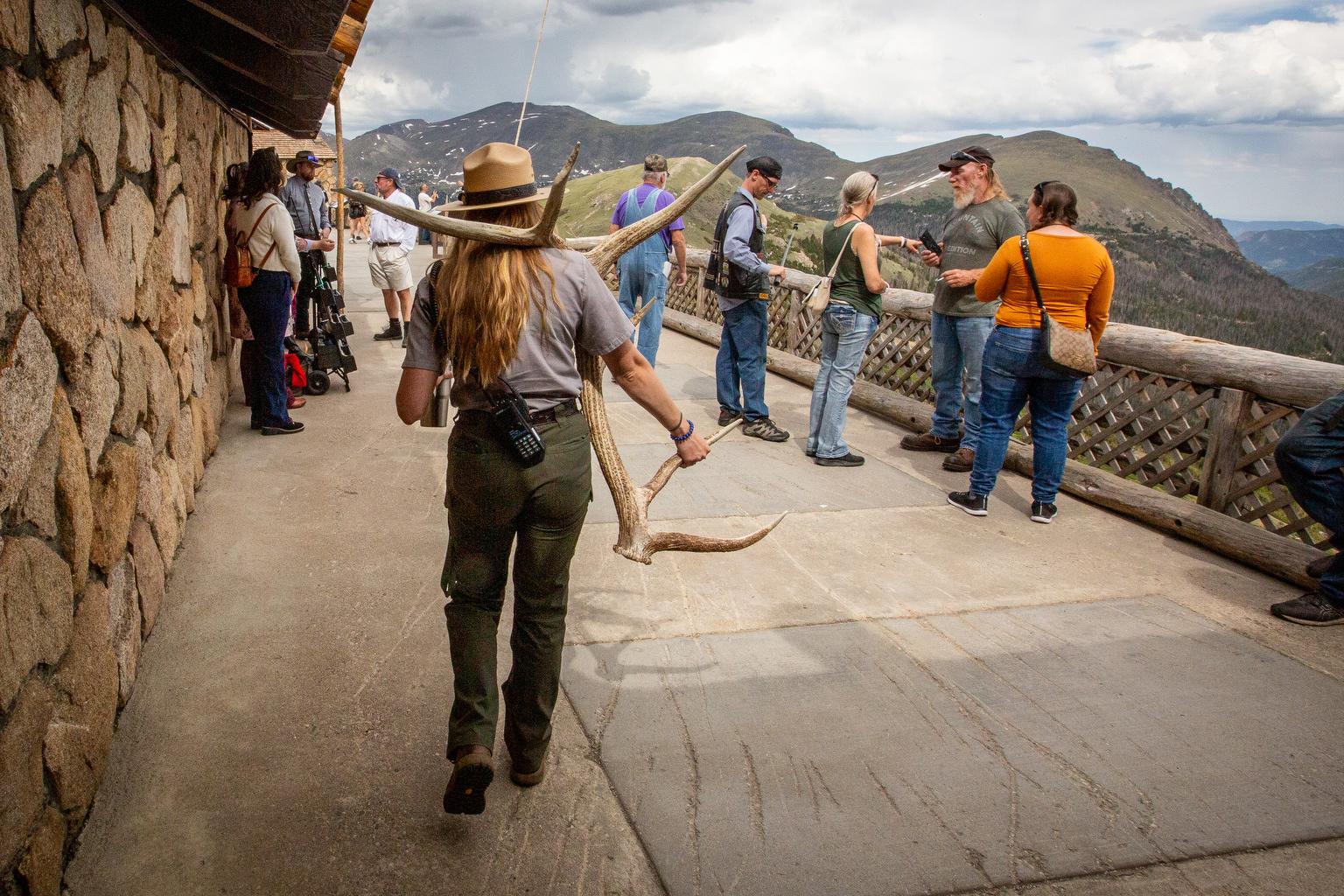
The federal government touches every corner of Colorado, from forestry analysts in Colorado Springs and IRS workers in Grand Junction to housing analysts and food safety inspectors in Denver. Now, job cuts are rolling through Colorado as President Donald Trump seeks to upend the federal workforce just weeks after being sworn in.
Although the jobs are wide-ranging, there is a common thread in what the state’s federal workers are feeling: chaos.
CPR spoke to federal workers about their jobs and the cuts and how they are faring. No one wanted to use their name for fear of retribution but still wanted to share their experience.
At the Pike Peaks Ranger District office in Colorado Springs, which manages about 230,000 acres of the Pike-San Isabel National Forests and Cimarron and Comanche National Grassland, at least four people lost their jobs last week, according to one of the people, who asked to stay anonymous due to concerns going public could damage future job prospects.
The forest service worker, an archeologist who assesses projects to ensure historical artifacts aren’t disturbed, was in his probationary period. Still, he said the abrupt firing came as a surprise during what he thought was a routine meeting. There was no advance written notice.
“My immediate supervisor – she didn’t even know about it – came into the office with me. We thought we were just having a conversation. Then the district ranger pretty much said that he got a call … and that they have to immediately fire 3,400 employees from the forest service,” the former forest service employee.
He filed for unemployment benefits from the state while he is looking for a new job. The U.S. Department of Agriculture said yesterday it has let go of about 2,000 probationary, non-firefighting employees from the Forest Service.

More than 21,000 federal workers are in the Colorado Springs area, the Colorado congressional district with the biggest share of federal employees as a percentage of the total workforce, according to the Congressional Research Service. That number doesn’t include uniformed military personnel, but it does include civilian workers at U.S. military bases and the U.S. Airforce Academy. Billionaire Elon Musk’s Department of Government Efficiency, or DOGE, has reportedly earmarked the Department of Defense for its next round of cuts.
“I feel like for how many people they're terminating … and so quickly … I try to hurry up and jump on the ball. I have already had some interviews and stuff that have been promising. The big thing is for people to really try to jump in the job market as soon as possible,” the former forest service worker said.
Larger and deeper cuts are imminent. Agency heads are required to submit plans to DOGE by March 13 about how they plan to further cut staff, according to an email sent to employees of the U.S. Department of Housing and Urban Development and viewed by CPR. HUD staff will be reduced by more than 50 percent, according to the email. Some departments within HUD will see bigger cuts, the email said.
“Employees who will not be retained will likely be notified by the end of April. Upon notification, employees have 30 more days on the jobs,” the email said.
HUD employees were bombarded with emails encouraging them to resign when the government issued a mass buyout offer last month, according to a Denver-based employee who wanted to stay anonymous for fear of retaliation while she still has a job. She has been in her role for a little over three years. She doesn’t expect the job to last judging by where the cuts are likely to be.
She and her husband are scrambling to figure out where they can trim their budget.
“Two weeks ago, I signed the kids up for summer camp, which is $6,000, and now I’m getting fired anyway, and I’ve just spent all this money trying to get them in. So now I’m emailing all the camps being like ‘Hey, can I have my deposit back?’”
The job cuts started with probationary workers because they don’t have the same protections as employees who have had their jobs for a number of years. That makes them easier to fire. But that’s a big setback for agencies that have struggled to fill positions.
“So far the cuts have impacted the newest of our employees. It’s a big hit for many reasons. One in particular is that we’ve been short-staffed for varying reasons for years,” said a Denver-based worker who has been with the USDA for more than 25 years and currently works on conservation issues with farmers and ranchers.
The USDA employee also spoke anonymously to protect her job. She has served under a number of administrations of both political parties.
“This feels like there is no care for these people that are civil servants under the guise of reducing the number. It feels so wrong. We’re grown people. We’re all professionals. You [the new administration] come in and say ‘Hey we want to take a look at what the previous administration was doing.’ That stuff happens. But this feels like it’s intentionally designed to be chaotic. I didn’t take it [the buyout offer] because I don’t make decisions in chaos,” she said.
A Denver employee with the Environmental Protection Agency, an army veteran, said she and many of her colleagues are sticking it out.
“I don’t think they realize that 30 percent of the federal workforce is veterans, and we’ve all got this mentality from service of ‘embrace the suck,’” she said. “You’re going to have to pry this job from my cold, dead hands. I will keep doing my duty.”
But the specter is there. She said there is a little bit of fear every time the office gets an email.
“Is now the time? Is this the one?” she said.
On top of the constant threat of job loss, the Denver-based HUD worker received an email this week that encouraged employees to send examples of fraud, waste and abuse to a DOGE email address. The email stressed the DOGE team is “open to any and all suggestions.” She said the email is being construed as an attempt to get people to turn in their coworkers.
The influx of job seekers could be hard to absorb as DOGE takes an ax to government agencies across the state. There were roughly 40,000 federal workers in Colorado as of the last count in March.
Colorado’s unemployment rate has already been climbing for more than a year.







